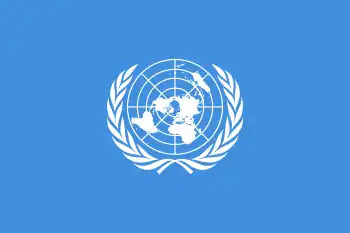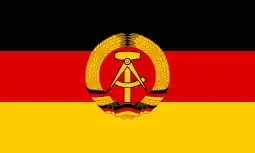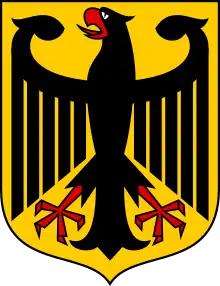Germany and the United Nations
The relationship of Germany and the United Nations first began during World War II. The United Nations then was synonymous with the Allies of World War II and Germany then being the Greater German Reich, a member of the Axis powers. With the war ending in the defeat of Germany, the country's territory was divided amongst the victors and what was to remain Germany was under Allied administration. In 1949, two new countries were created in these occupied territories: the Federal Republic of Germany (West Germany) in May and the German Democratic Republic (East Germany) in October.
  | |
| United Nations membership | |
|---|---|
| Membership | Full member |
| Since | 18 September 1973 |
| Former name(s) |
|
| UNSC seat | Non-permanent |
| Ambassador | Christoph Heusgen |
  | |
| United Nations membership | |
|---|---|
| Membership | Former full member |
| Dates | 18 September 1973 – 3 October 1990 |
| UNSC seat | Non-permanent (elected once) |
Both Germanies were admitted as full members of the United Nations (UN) on 18 September 1973. The two countries eventually merged on 3 October 1990, signifying an end of the Cold war era.
Germany is the fourth-largest contributor to the UN budget, after the United States Japan, and China, with 155 million US dollars, or roughly 6% of the UN budget for the 2018-19 biennial budget.[1]
History


The Federal Republic of Germany (West Germany) was admitted to the UN as an observer in 1952. The German Democratic Republic (East Germany) was admitted as an observer in 1972.[2] On 18 September 1973 both were admitted as full members by the United Nations General Assembly, following the recommendation of the Security Council by Resolution 335 on 22 June 1973. Through the accession of the German Democratic Republic to the Federal Republic of Germany, it was effective on 3 October 1990. The territory of the German Democratic Republic became part of the Federal Republic of Germany, today simply known as Germany.[3] Consequently, the Federal Republic of Germany continued being a member of the UN while the German Democratic Republic ceased to exist.[4]
2011-2012 UNSC seat
For the years of 2011 to 2012 Germany has been elected as a non-permanent member of the United Nations Security Council (UNSC). However, Germany received criticism from its European and US allies for abstaining on the Libyan no-fly zone resolution that they were voting for. Former German Foreign Minister Joschka Fischer argued that "Germany has lost its credibility in the United Nations and in the Middle East. German hopes for a permanent seat on the Security Council have been permanently dashed and one is now fearful of Europe's future."[5][6]
Permanent UNSC seat
France and the United Kingdom have explicitly called for a permanent seat on the UN Security Council for their close EU partner.[7][8] French president Jacques Chirac said in a speech in Berlin in 2000 that "Germany's engagement, its ranking as a great power, its international influence—France would like to see them recognized with a permanent seat on the Security Council".[9] The former German Chancellor, Gerhard Schröder, also identified Russia, among other countries, as a country that backed Germany's bid.[10] Italy and the Netherlands on the contrary, suggest a common European Union (EU) seat in the Council instead of Germany becoming the third European member next to France and the UK. The former German Foreign Minister Joschka Fischer said that Germany would also accept a common European seat; however, as long as France and the UK are not willing to give up their own seats, Germany should also have a seat.[10] Thus, the German campaign for a permanent seat was intensified in 2004. Schröder made himself perfectly clear in August 2004: "Germany has the right to a seat."[11] Its bid is supported by Japan, India, Brazil, France, the United Kingdom and Russia, among other countries. Current German Chancellor Angela Merkel, who had initially been quiet on the issue, re-stated Germany's bid in her address to the UN General Assembly in September 2007. In July 2011, Merkel's trip to Kenya, Angola, and Nigeria was thought to be motivated, in part, by the goal of seeking support from African countries for Germany's bid for a permanent seat on the Security Council.[12]
See also
References
- Osmańczyk, Jan (2003). Mango, Anthony (ed.). Encyclopedia of the United Nations and International Agreements. 2: G–M (3rd ed.). Routledge. ISBN 0-415-93920-8.
- "Note on 45th Session of General Assembly" (PDF). United Nations.
- "Yearbook of the United Nations". United Nations.
- Fischer Joins Criticism of German Security Council Abstention, Spiegel Online
- Germany has marginalised itself over Libya, The Guardian
- "Joint UK-France Summit Declaration". British Prime Minister’s Office. 27 March 2008. Archived from the original on 9 January 2013. Retrieved 15 December 2008.
- "Speech: "Together, we've spent 70 years striving for peace, 70 years helping the poorest and most vulnerable"". UK Foreign & Commonwealth Office. 23 October 2015. Retrieved 25 October 2015.
- "Chirac pushes two-speed Europe". BBC News. 2000-06-27.
- https://web.archive.org/web/20071012131441/http://voanews.com/english/2006-11-01-voa46.cfm. Archived from the original on October 12, 2007. Retrieved September 21, 2011. Missing or empty
|title=(help) - "Germany Hopes for UN Security Council Seat Dampened", Deutsche Welle, 20 August 2004. Retrieved 14 May 2006.
- Allan Odhiambo (2011-07-13). "Germany shops for UN seat, business in Africa visit". Business Daily. Retrieved 2011-07-25.
External links
- The Permanent Mission of Germany to the United Nations New York
- United Nations, German Federal Foreign Office
